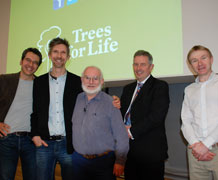
The event at the University of Exeter highlighted the benefits of rewilding.
Rewilding, wellbeing and return of lynx in spotlight at Exeter
Rewilding the United Kingdom – from restored forests to the return of predators such as the lynx – were in the spotlight at a topical lecture featuring acclaimed writer George Monbiot and leading conservationist Alan Watson Featherstone, Founder of award-winning charity Trees for Life.
The event at the University of Exeter highlighted the benefits of rewilding – the restoration of damaged natural ecosystems, and the return of keystone species – including for people’s wellbeing.
Alan Watson Featherstone – who at the end of 2015 was awarded an alternative New Year’s honour by The Guardian newspaper, in a celebration of the heroes of the year – said: “Rewilding offers an exciting vision of hope. In the Highlands of Scotland we have an opportunity to reverse environmental degradation and create a world-class wilderness region – offering a lifeline to wildlife including beavers, capercaillie, wood ants and pine martens, and restoring natural forests and wild spaces for our children and grandchildren.”
George Monbiot said: “Rewilding offers us a big chance to reverse destruction of the natural world. Letting trees return to bare and barren uplands, allowing the seabed to recover from trawling, and bringing back missing species would help hundreds of species that might otherwise struggle to survive – while rekindling wonder and enchantment that often seems missing in modern-day Britain.”
The event – organised by the Network of Wellbeing (NOW, www.networkofwellbeing.org) with the University and Community Initiatives in Exeter –explored the links between rewilding and wellbeing, and highlight ways in which people can get involved in initiatives in their own communities. This includes taking inspiration from Trees For Life as a practical, grassroots organisation through which people can connect, be active, take notice, keep learning and give – five ways to wellbeing based on 40 years of international research.
Trees for Life (www.treesforlife.org.uk) is restoring the ancient Caledonian Forest in the Scottish Highlands, and offers many opportunities for volunteers to support its work and gain conservation experience.
Today few areas of the world are truly wild and in the UK, even Scotland is no exception. Long-term deforestation and overgrazing by too many deer and sheep has left much of the land depleted and barren, with wildlife in retreat or missing. The Caledonian Forest – Scotland’s equivalent of a rainforest – is one of the UK’s most endangered habitats, with many of its rare species facing extinction.
Yet action across Scotland is showing how restoring natural processes and protecting wilderness areas, and reducing human interference in ecosystems, can make a positive difference. This includes the restoration of native forests at many Highland sites, the re-establishment of birds of prey such as sea eagles, ospreys and red kites, and the trial reintroduction of European beavers at Knapdale in Argyll.
Future rewilding could involve the reinstatement of missing species, including apex predators – which play a crucial top-down regulatory role in ecosystems. Trees for Life believes that the Eurasian lynx – already reintroduced to areas of Europe such as the Alps and Jura mountains – is a realistic candidate for reintroduction. It offers little threat to sheep and none to humans. It is a specialist predator of roe deer, a species which has multiplied in Britain in recent years and which holds back the natural regeneration of trees through intensive browsing.
The latest thinking on rewilding – including recent scientific discoveries – has been captured in George Monbiot’s highly-praised and gripping book, Feral, which lays out a positive environmental approach in which Nature is allowed to find its own way. George – well-known author and columnist for The Guardian – is also a key supporter of Rewilding Britain, a charity working for the mass restoration of ecosystems in Britain, on land and at sea. See www.rewildingbritain.org.uk.
NOW's holistic approach to wellbeing shows that personal, social and environmental wellbeing must all be approached together – which means that rewilding, by enhancing nature, can have a great role to play in enhancing people’s wellbeing.
People can follow online conversation around the rewilding events on Twitter by using the hashtag #RewildingWell.
Date: 15 January 2016
